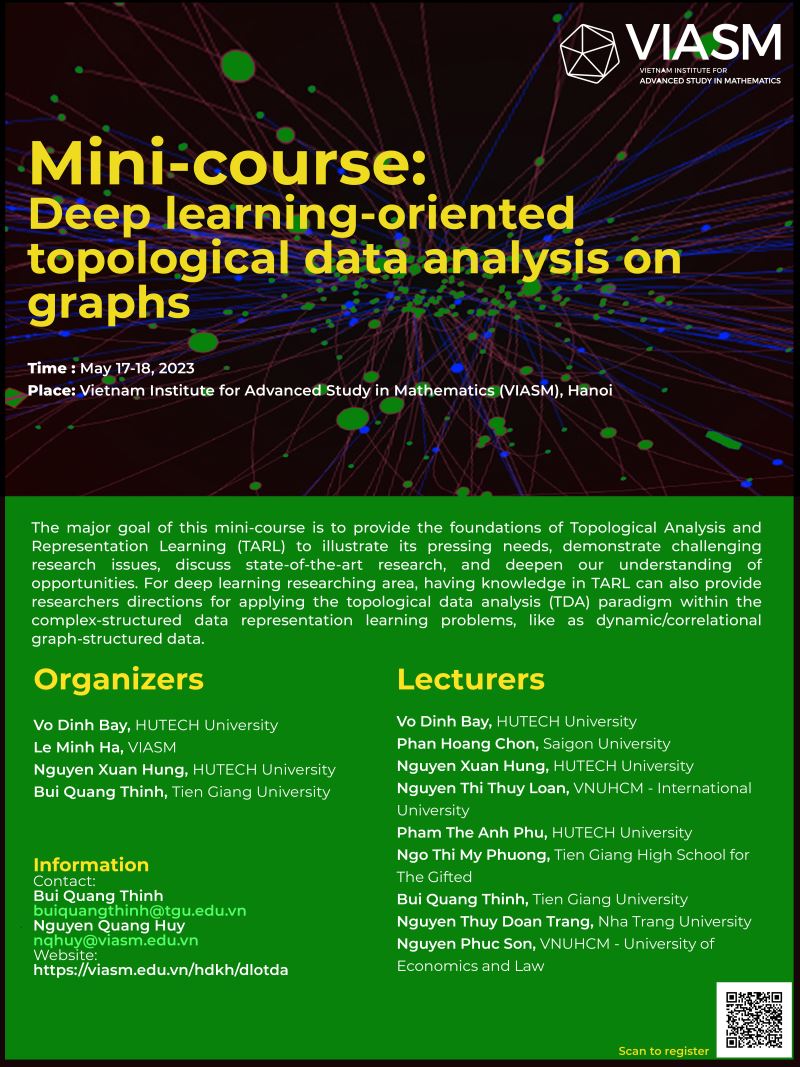Mini-course: Deep learning-oriented topological data analysis on graphs

Time:
Venue/Location: Vietnam Institute for Advanced Study in Mathematics (VIASM)
1. Objective
Today, data is increasingly exploding and growing at breakneck speed. It grows uncontrollably both in size and dimension with the noise of uncertainty. Exploring and extracting meaningful insights become common challenges at the core of modern data analytics. It has been demonstrated that real-world data are often measured and collected as a subset of the high-dimensional metric space. However, they often exhibit low dimensional intrinsic structures detected by geometry-oriented methods such as manifold learning, graph representation learning, geometric deep learning, and topological data analysis. This characteristic is why recent years have seen significant interest and progress in geometric and topological approaches to representation learning, which enable tractable exploratory analysis by domain experts who are often not computation-oriented.
The major goal of this mini-course is to provide the foundations of Topological Analysis and Representation Learning (TARL) to illustrate its pressing needs, demonstrate challenging research issues, discuss state-of-the-art research, and deepen our understanding of opportunities. For deep learning researching area, having knowledge in TARL can also provide researchers directions for applying the topological data analysis (TDA) paradigm within the complex-structured data representation learning problems, like as dynamic/correlational graph-structured data. Especially, in recent times, with the uprising of graph neural network (GNN) in multiple domains of computer science, the TDA is considered as a powerful tool for getting more inside rich-structural and topological features of the given graph-based datasets. Thus, it is promising to improve the performance of existing graph representation learning tasks. From the long-term perspective, we hope that the mathematical background and informatics techniques provided in the course will not only attract young researchers to the field, but also be helpful for other problems in Mathematics and Computer Science.
2. Expected participants
The course is suitable for advanced undergraduate, master/PhD students, as well as young researchers in Mathematics and Computer Science.
3. Organizing Committee
- Vo Dinh Bay (HUTECH University, Viet Nam)
- Le Minh Ha (Vietnam Institute for Advanced study in Mathematics, Vietnam)
- Nguyen Xuan Hung (CIRTech Institute, HUTECH University, Viet Nam)
- Bui Quang Thinh (Tien Giang University, Viet Nam)
4. Invited speakers
- Vo Dinh Bay, HUTECH University
- Phan Hoang Chon, Saigon University
- Nguyen Xuan Hung, HUTECH University
- Nguyen Thi Thuy Loan (VNUHCM - International University
- Pham The Anh Phu, HUTECH University
- Ngo Thi My Phuong, Tien Giang High School for The Gifted
- Bui Quang Thinh, Tien Giang University
- Nguyen Thuy Doan Trang, Nha Trang University
- Nguyen Phuc Son, VNUHCM - University of Economics and Law
5. Language: Vietnamese and English
6. Mode: Hybrid (Online and Onsite)
7. Contact
- Bui Quang Thinh (Tien Giang University), buiquangthinh@tgu.edu.vn
- Nguyen Quang Huy (Vietnam Institute for Advanced study in Mathematics), nqhuy@viasm.edu.vn

